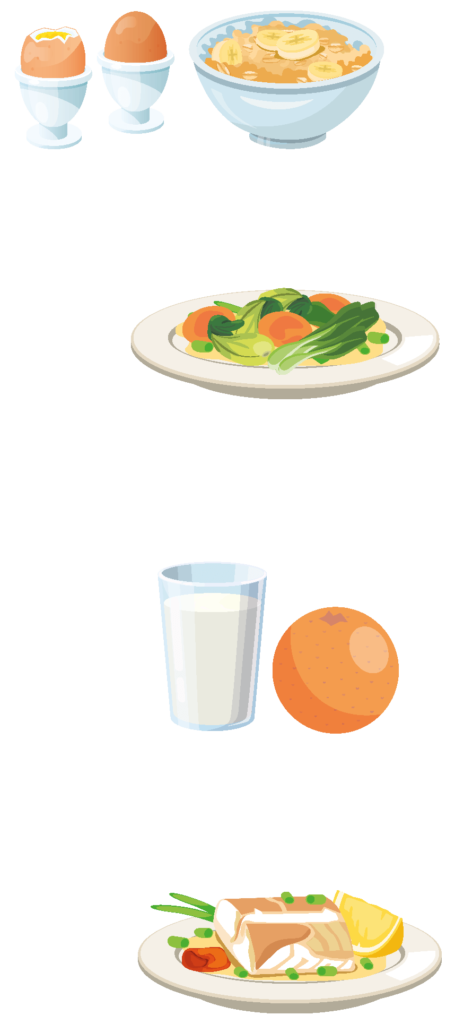Older Adults Need More Protein
By Dr. Zaitun Yassin
Nutritionist, Positive Healthy Ageing Programme Malaysia

As we age, our bodies undergo several changes which ultimately affects our nutritional needs. Let us learn more on the role and importance of protein in fuelling our body to power up our golden years!
The importance of getting sufficient daily protein Protein is an important nutrient that plays an integral role in various physiological functions (Table 1). As we age, protein becomes increasingly more important. Particularly when it comes to preserving muscle mass and strength, as our body may begin to lose them as early as at the age of 30. This is what is known as sarcopenia, a condition that describes a gradual loss of muscle mass, strength, and function due to ageing. Sarcopenia affects a staggering 59.8% of older adults aged between 60 to 70 years old (Reshmy, 2022). Therefore, as protein can help build, repair, and maintain body tissues (e.g. muscle, skin, etc.), it is important to consume enough protein to help potentially slow down the onset and progression of sarcopenia. Maintaining muscle mass and strength is also important as it can reduce the risks of back pain, falls and bone fractures. Sufficient protein intake can also help reduce recovery time from illnesses.
Table 1: Summary of the physiological functions of protein in the body
| Functions of Protein in the Body |
| • Building and repairing tissues (e.g. muscle, bones, skin, etc.) when damaged • Helps in the wound healing process • Production of antibodies of the immune system • Production of enzymes in the body which helps to regulate metabolism, digestion, and immune function |
Meeting protein needs
We can obtain protein from both animal and plant-based sources. Common animal-based protein includes poultry, eggs, fish, meat, etc. Plant-based proteins such as tofu, chickpeas, tempeh, etc. are also good sources of protein, and are generally lower in fat and packed with vitamins and minerals like the B vitamins, zinc, calcium, etc. According to the Malaysian Recommended Nutrient Intake 2017, it is recommended that on average, older male and females adults aged 60 years and above require around 58g and 50g of protein per day respectively. This is approximately equivalent to around 4 servings of protein foods per day (1 serving = 14g of protein).
Refer to Table 2 below to better visualise a single serving of protein.
Table 2: Examples of different food portions that are equivalent to a single serving of protein
| Food | Portion Equal to Single Serving of Protein |
| Chicken drumstick | A single medium drumstick |
| Lean beef | A palm sized portion |
| Chicken eggs | Two eggs |
| Ikan kembung | A single medium sized fish |
| Tofu | One and a half square pieces |
A simple way to ensure we are eating enough protein as part of a balanced meal is by following the ‘Quarter-Quarter-Half’ healthy plate concept, which involves dividing each meal into a quarter plate of lean protein (e.g. grilled chicken breasts), another quarter plate of complex carbohydrates (e.g. rice, bread), and the remaining half plate of fruits and vegetables (e.g. mixed vegetables/ulam and an apple). In addition to this, it is important to evenly spread the daily recommended intake of protein throughout the day for steady supply of protein and to stimulate muscle protein synthesis throughput the day. A full day example menu can be seen in Table 3 below. Additional tips include: (1) choose protein foods from both animal and plant sources, and (2) opt for fresh, lean cuts of meat – avoiding preserved/processed meats which are high in fats and sodium.
Table 3: Full day example menu
| Breakfast • 2 half-boiled eggs • 1 slice of wholemeal toast/1 bowl of oatmeal • Half a plate of vegetables e.g. cucumber slice & mixed fruits (e.g. papaya, watermelon, apple, etc.) |
| Lunch • Quarter plate of tofu with minced meat/stir-fried chicken • Quarter plate of steamed brown rice • Half a plate of stir-fried mixed vegetables/vegetable stew (e.g. carrots, bok choi, etc.) |
| Snack • 1 fruit (e.g. 1 orange, 1 slice of pineapple etc.) • 1 glass of milk |
| Dinner • Quarter plate of grilled/steamed fish • Quater plate of steamed potatoes • A bowl of vegetable soup |

Consider your personal dietary need
There are various factors which affect one’s physiological need for protein, for example those who are sick or recovering from an illness may require a higher protein intake to support healing and prevent muscle loss.
As a rule of thumb, you should be taking in 1.0 to 1.2 grams of protein per kilogram of your body weight in order to fight against muscle loss. However, it should be noted that older individuals with specific dietary requirements (e.g. those with kidney disease), or even those who find it difficult to chew, should consult with a dietitian to find out how to adjust meals to meet their daily protein requirements.
Although there are many benefits of ensuring sufficient protein intake in older adults, eating protein alone is not enough. We should also strive to have a balanced diet and regular exercise, which can also help us maintain our health and independence as we age.


